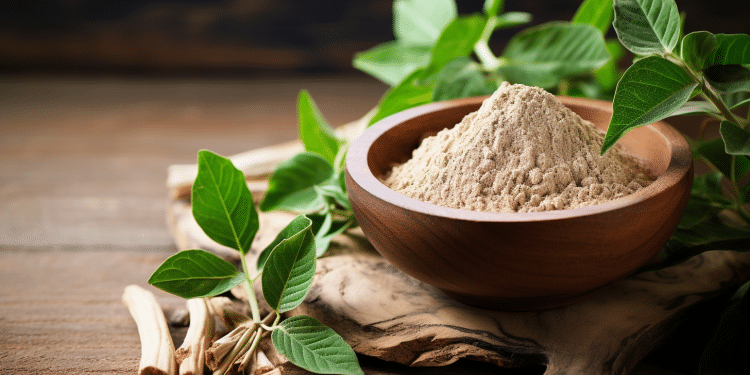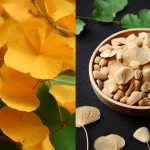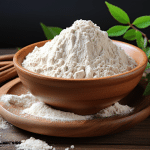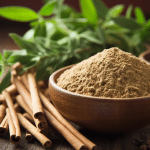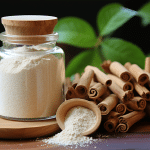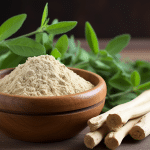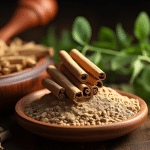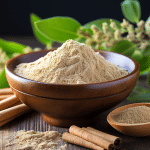So Is Ashwagandha an Adaptogen?
Yes, Ashwagandha is an adaptogenic plant and has been used in Ayurvedic medicine for over 3000 years. It is one of the most widely used and widely researched adaptogens because of its potent capacity as a anti-stress agent. Much like all adaptogenic herbs, ashwagandha helps your body to stay in a healthy state, particularly during times of physical or emotional stress. Adding this specific adaptogenic herb may support and balance the body, helping lessen the effects of stress, as well as increase general resilience, in an effort to help you break any negative cycles or situations that may be adversely impacting your wellbeing.
Botanically known as the root Withania somnifera, Ashwagandha is used more often than not for its benefits and health properties. It is typically grown in the Middle East, India, as well as parts of Africa. Known in India as “Stallion Strength”, some benefits of ashwagandha roots include supporting healthy immune system following an illness, improving endurance, and it even acts as a natural stress reliever. Ashwagandha has also been called Indian Ginseng, Winter Cherry, and Somnifera Root. As far as its actual name is concerned, the word ashwagandha literally means “smell of horse”, which is an appropriate translation because its cool root scent is pretty much like a horses. To add on top of it, there is also the traditional belief that this root can help in developing the power and vitality of a horse within the one taking ashwagandha.
Ashwagandha has been used in health practices such as Aryuveda, a health system originating over 3000 years ago in India, to combat stress, increase stamina, and foster an overall feeling of tranquility. While the science is still ongoing, but studies that have been done so far are very promising, contemporary research supports the potential for ashwagandha to decrease stress and anxiety in adults. The potential for coping with daily stress has undeniable appeal, but this does not mean that we all need to be dosed with ashwagandha before battling a rush-hour subway.
What are Adaptogens, Anyway?
According to naturopath Edward Wallace, an adaptogen does not have any particular function, but rather helps you to react to any exposures or stresses by regulating physiological functions. Basically, adaptogens help to balance, repair, and protect your body. Furthermore, this research found various adaptogens are capable of helping the body balance and react against stress. A certified herbalist provided us with a list of recognized adaptogens in his book, adaptogenic herbs. Let us take a look at the seven most useful and popular adaptogens, as well as their health benefits.
1. Ashwagandha
Ashwagandha is first and foremost on the list. Easily add this potent adaptogen to your favorite warm drink on-the-go with our single-serving, portable Reishi Relax With Ashwagandha Powder Stick. Take advantage of these Ashwagandha benefits, even when you are on the go. It reduces stress levels and provides support to maintain a balanced, effortless state of mind. Improves sleep quality, which allows for a fuller feeling of rest every night.
2. Panax Ginseng
Panax Ginseng is a small, woody shrub that belongs to the plant family Araliaceae. Some benefits of this adaptogen include that it helps to regulate physical endurance and mental alertness. It also enhances cognitive functions, making it a popular, natural nootropic. And last, but certainly not least, Panax gives you an immunity-boosting kick.
The benefits of holy basil has traditionally been a component of Ayurvedic medicine, which is known as the rejuvenating addition to Indian diet. Besides being a delicious ingredient on a pizza, it supports skin health, thus its claims to anti-aging benefits. It also provides adaptogenic support to support general wellbeing and body functions, and helps to balance the stress response of the body. Astragalus root might not be as well-known as the aforementioned adaptogens, but it is actually one of the strongest plants to support immune function.
This herb helps with the stress response, supporting general well-being. Just like other adaptogens, it helps to support the health of the immune system and skin, improving the response of the body to environmental stressors.
Licorice Root is another adaptogen, and no, we are not talking about black candies, which are sadly non-adaptogenic, too, yknow. We are talking about a type of licorice plant known formally as Glycyrrhiza glabra.
Its adaptogenic benefits include supporting intestinal health, improving stamina and endurance during physical activities, and strengthening your immune system. Rhodiola Rosea is another powerful adaptogenic herb, which is also known by a few other names, such as Arctic Root, Golden Root, Roseroot, and Kingas Crown. The benefits of this powerful adaptogen include supporting physical function and cognitive ability. It supports the bodys response to stress, promoting energy and athletic performance.
Much like other adaptogenic mushrooms of its type, Reishi mushrooms are found in different parts of Asia, including China, South Korea, and Japan. As raw reishi mushrooms can be fairly bitter with a hard texture, they are far more delicious as supplements or powders. Speaking of which, our tasty Reishi Relax Powder is ideal for a post-workout smoothie, or as an excellent add-on for early morning coffee. Why You Should Add Reishi To Your Daily Diet?.
Well, when consumed consistently over time, it helps to maintain heart health, helps combat fatigue related to stress, naturally soothes the body, and may help you to feel more relaxed. I like using it in the evenings just before going to sleep.
